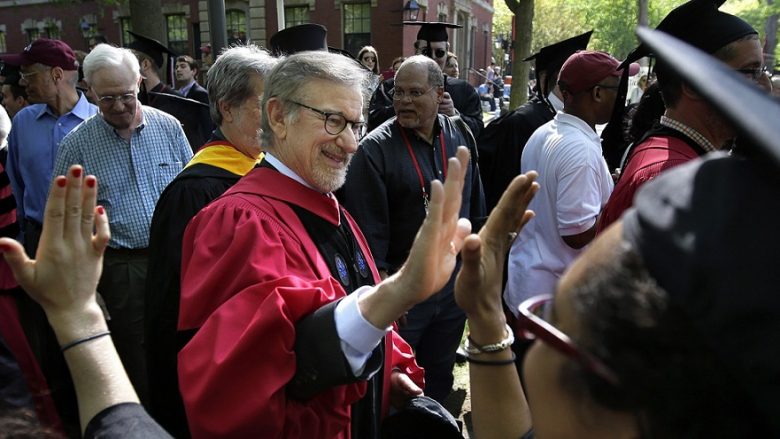Harvard professors join chorus against club leadership ban
By Evan Lips | May 27, 2016, 20:08 EDT
 Harvard University’s commencement featured filmmaker Steven Spielberg, center, and provided a break from the controversy over a new policy about single-sex off-campus clubs. (AP Photo/Steven Senne)
Harvard University’s commencement featured filmmaker Steven Spielberg, center, and provided a break from the controversy over a new policy about single-sex off-campus clubs. (AP Photo/Steven Senne) CAMBRIDGE – The drumbeat questioning the decision to punish Harvard College students who join single-sex social organizations is growing louder as a growing number of faculty and alumni and even a former university president have opposed the move.
This week, 12 Faculty of Arts and Sciences professors fired off a denunciation of Harvard President Drew Faust’s May 6 declaration of the new policy. It says that beginning with the class that enters in fall 2018, students who elect to join single-sex clubs, including fraternities, sororities and centuries-old Final Clubs, will be barred from captaining athletic teams, applying for competitive scholarships or leading other on-campus organizations supported by the school.
The professors’ denunciation, published by the Harvard Crimson student newspaper, calls the new policy discriminatory. It begins with an assertion against infringing on students’ constitutional rights:
“Harvard College shall not discriminate against students on the basis of organizations they join, nor political parties with which they affiliate, nor social, political or other affinity groups they join, as long as those organizations, parties or groups have not been judged to be illegal,” the statement says. “Students may exercise their civil right to free assembly without fear that Harvard will disadvantage them because they have joined an organization that does not comply with Harvard policies.”
The faculty members who signed the statement also cited faculty legislation dating back to 1992 in which the option to punish students who joined the U.S. military’s Reserve Officers’ Training Corps, or ROTC, despite its discriminatory policies was specifically considered and rejected. A report on that issue concluded: “This would be a paternalistic policy inconsistent with Harvard’s general approach.”
The faculty at the time also decided that such punishment “would seek to extend the reach of Harvard’s non-discrimination policy beyond its proper boundaries.”
“These ‘proper boundaries’ were not specified in the 1992 legislation, probably because they went without saying – recent administrative proposals suggest that there is uncertainty about the limits of Harvard’s control over students’ lives,” the professors say in this week’s statement, which refers to putting a motion before a faculty legislative body. The Final Clubs, as well as fraternities and sororities, are all off-campus groups with no formal ties to the college.
“We therefore believe that this legislation, based on university precedent, history, and practice, is needed to protect the rights of current and future students – and, indeed, by extension, the rights of current and future faculty and staff,” the professors say.
The administration’s foray into the territory of off-campus social clubs escalated this year after a school task force on campus sexual assault released a scathing report slamming the prestigious and exclusive Final Clubs, specifically the six whose membership continues to be all-male. While the Ivy League university severed formal ties with the clubs decades ago over their sex-segregated practices, it stopped short of banning membership by students.
The report accused the all-male Final Clubs, which have their own buildings located near the Cambridge campus, of providing fertile ground for sexual assault.
“Female Harvard College students participating in Final Club activities are more likely to be sexually assaulted than participants of any other of the student organizations we polled,” the report declared.
The task force based its findings in part on a controversial anonymous survey conducted last spring for the Association of American Universities. Critics have pointed out that the surveys omitted specific words like “rape” and “assault” after various universities complained that such words could trigger bad memories.
Recommendations from the task force included confronting students with an ultimatum – join one of the exclusive Final Clubs and risk expulsion.
In early May, the Porcellian Club, an all-male Final Club whose history dates back 225 years, fired off a letter to Harvard College Dean Rakesh Khurana challenging the task force’s findings and the survey underlying much of its report. The club’s letter also included analysis from a third-party statistician that shredded the survey results.
Days later, Khurana and Faust responded not just by imposing the leadership ban on future single-sex Final Club members, but also fraternities and sororities. That sparked a raucous protest from Harvard women who belong to sororities or one of the several all-female Final Clubs. The women said they felt they were being unfairly tied to and threatened because of a problem that doesn’t involve them or their organizations.
Khurana and Faust have been unyielding over the policy. Yet as a growing chorus of discontent grows from faculty members like the 12 who signed this week’s statement, some social organizations are already taking steps to either become co-ed or make other membership policy changes, the Crimson has reported. Harvard held its commencement ceremonies Thursday, so most students have departed for the summer.
This week, however, also saw former Harvard President Lawrence H. Summers enter the mix. Summers, in a Crimson interview, didn’t exactly endorse Final Clubs. But he made it clear that he supports freedom of association rights.
“If I had a child at Harvard, I would strongly discourage my child from being a member of a Final Club,” Summers said, according to the student newspaper. “That said, I think the freedom of association is a profoundly important value and I think the idea that we would condition fellowship letters or the opportunity to be elected by one’s peers as captain of a football team on agreement with certain values is inconsistent with the central values of an academic institution.”
Summers joined former College Dean Harry R. Lewis, one of Khurana’s predecessors, who last week likewise ripped the new policy.
A private letter penned earlier this month by Lewis, addressed to Khurana and obtained by the Crimson expresses a view similar to that expressed by Summers. Lewis is also one of the 12 signatories of this week’s statement.
In his private letter, Lewis described the atmosphere at some of the Final Clubs as “noxious,” even at one point lauding Khurana for taking steps to try and “reign them in.” But he warned about a precedent the administration’s specific decision could set.
“The good you may achieve will in the long run be eclipsed by the bad: a college culture of fear and anxiety about noncomformity,” Lewis wrote. “What’s new and troubling is the assertion that mere membership in an off-campus organization should be enough to trip an official college response against the student – even if the policies and activities of the organization and of the student members are lawful.”
Late Friday, a Harvard spokeswoman, Rachael Dane, said the administration had not changed course.










